Compiled and presented by R R (Bob) Hughes (1.6.4), May,2000
EARLY DAYS AT THE HOMESTEAD:
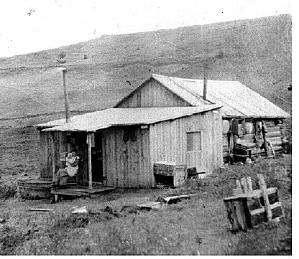
The Photo above was taken in 1910 at the homestead so the baby in Emily's arms would have to be Edwin.
The second child of Thomas S. and Emily Hughes, Lewis Alexander, was born August 24, 1911, at the homestead that his parents had staked out in the Meadow Creek area of southwestern Montana, Madison County. Tom was working at freighting and any job he could find. Maybe he would be home at night and maybe he would be gone for days. When Lewis was born, Emily's brother, Lou, and trained nurse wife were visiting at the nearby Mackel Ranch. A cousin, Norris Mackel, who was seven or eight years old at that time, said that he was given the daily chore of walking over to the homestead with a pail of fresh milk to help feed the new baby. Norris also hinted that he walked barefoot over the mile or so of cactus and rock covered hillside, and later told Lewis that he doubted the "result was worth the effort!"
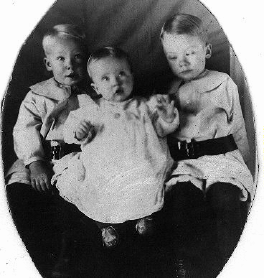
LEWIS, MARJORIE, EDWIN
Probable date for this photo is 1914, at Sumas, Washington. The family made a trip to Washington and Oregon after selling the homestead.
Life at the isolated homestead was difficult for the young family. An excerpt from a letter Lewis wrote in 1996 explains why they could not stay there in winter, and usually moved to one of the cabins at McAllister.
Lewis wrote:
"Woodcutters and moon-shiners, maybe, could survive the bitter cold and deep snow in those mountains, but, when they wished, they could come out on snowshoes. Leaving a young bride there in the winter, with two little ones, was definitely not in the cards. Dad was scratching for subsistence money, wherever work could be found, and had not a chance of getting back to a snowbound mountain cabin every evening."
"Dad's homestead on Leonard Creek was about one mile north of the Mackel Ranch. Mom stayed in the cabin while Dad freighted ore from the South Meadow Creek mines and brought supplies back on the return trip."
"After Dad sold the homestead, we lived in the house on Fletcher Creek, in section 7, that Uncle Tom owned at the time. Ed and I opened gates for Mom when she went for supplies. Mom had to back the Model T up the grade, out of Fletcher Creek, as it wouldn't pull out forward. We traveled through the Schoenberger place. Ed remembers old John Schoenberger paying us a nickel apiece for gopher tails."
From a 1993 letter:
"No record in the court house of Dad buying or selling the homestead, or that it was ever proven up on. Maybe he and Ira just sold to the Mackels, and didn't publicize it. Tony Mackel shows up, in the records, with Alex Mackel, with 640 acres in 19l5. Suppose they got the money to buy Dad and Ira out, from Alex? The court house had a fire about 30 years ago"
"About the McKinnon place, we lived there maybe two summers. Uncle Roy came out one summer with a new Overland touring car; and we all headed for Yellowstone Park. Dad, Mom, all of us, I don't know how many, in a Tin Lizzie, Model T. Got to Henry's Lake, and axle went out of Overland. We all came back in Tin Lizzie. Uncle Roy and Dad went back with repairs and Uncle Roy seemed hard to talk to about cars."
"We were living on the McKinnon place when spring flooding was in season. Ed and I had a desire to wade the creek. The bridge was nearby, so Ed carried his shoes over and came back. Guess who said, 'Watch this', and wound up to pitch shoes over tall willows. One caught, and dropped into the raging torrent. Ed and me and Nipper all dived for some hasty scuba work, but never found a trace. We were standing there, looking like three drowned rats, when Ed says 'Jeez, what'll Dad say?' Even Nipper turned white. I don't remember any lethal killings on Leonard Creek, so probably Mom intervened, as usual."
"About the Fletcher Creek place: Because Dad was living on Fletcher Creek and working on the T. V. Ranch, he went with the ranch when Uncle Tom Vincent sold it to Templeton. I remember alfalfa everywhere on the Fletcher Creek place, by way of stolen water from South Meadow Creek (Uncle Tom's water), and Templeton and me driving derrick team. Dad again went with the ranch to Barnett, a sheep man. He "terminated" shortly, and we moved to old hotel building at McAllister."
Lewis's letter continues, "I think that we must have spent several winters in Alex McAllister's house (where Jim and Thelma built new post office), because it was wartime, and we had no sugar. Ed and I got an air gun for Xmas, with one rubber ball bullet, and it would really sail. One time I shot it way up in the air and Curly never could find it. We were pretty doleful until Mom showed us how to use corks. Mom could solve anything."
GROWING UP, AND THE HOME RANCH
Lewis wrote:
"Eventually, we moved to 'Homestead #2', located on highway 287, which at that time was just two ruts through the sagebrush."
Lewis referred to the Home Ranch as Homestead #2. I have to rely on my own memories for timing of this move - I think it was 1919 when I was four years old. I remember sitting in the back of a wagon loaded with household goods and I was pulling a little red toy wagon on the end of a rope along behind. Somewhat later I remember a group of World War I soldiers walking up the road to Ennis from Norris. Mother made sandwiches for them.
The map shows how the home ranch developed in later years. When we moved there, one mile south of McAllister, the property was undeveloped, no water except for a well and a creek that dried up in the summer and froze up in the winter. The West Side Canal for irrigation was under construction. The only buildings there when we moved were the granary, chicken house, outhouse and the original portion of the house
Lewis continues:
" Uncle Tom's and Dad's agreement was everything half and half. Translated, it meant that Dad did the work, Uncle Tom got the money, and we half froze and half starved.
"The stoves in the shack were hungry for wood. Dad would get his team and logging outfit ready by daylight. The team pulled the bob sled, to which he bound the front ends of the poles to be sawed for wood, and drug the back ends. It was a l4 mile round trip to Daisy and Virginia Creek. On Saturday mornings, Dad told Ed and me, 'You saw enough wood to get by until next Saturday.' He laid on us a one man cross cut (saw) with a wood peg handle on the main end, (Ed's) and a big horseshoe bolted to the small end (mine).
"Ed and I jerked that saw back and forth a million times. Ed's back was painless and it was most fortunate that I outsmarted him regularly. I bore down on my end on his stroke and the sawdust flew. So did his temper. He'd catch on and cry, "Quit riding your end!". Actually, I was helping him, but he never understood. Sometimes he would come over to my side and get plumb nasty. Mom would come out and straighten us out with "Your Dad will be home soon, maybe I can see him now". That got our full attention."
Another of Lewis's papers describes the axe accident that resulted in the scar across our mother's nose, which was there the rest of her life.
"Every spring Mom ordered 50 to 100 baby chicks, from Sears and Roebuck, and they arrived through the mail. One spring Mom was busy gathering her mass of peeping little chicks together, making sure each was comfortable. Dad was observing the show with a razor sharp axe resting on his shoulder. Mom raised up, in perfect alignment with the axe, and practically sliced off the end of her nose. Blood flew everywhere. Dad promptly dropped the axe, told her to hold the nose in place, amid uttering endearments known only to mountain men, made haste to get conveyance to a doctor. One ring on the telephone, and everybody in the valley knew that Tom Hughes had cut Emily's head off, and it was hanging by a thread.
"Mom was back with her chickens not long after, and Dad was down on his knees placing the little devils under cover. Dad learned the lesson well, as Ed and I can attest - there was never anything resembling a sharp axe on the ranch thereafter.
"Sunday dinners were fried chicken and home made ice cream, made from fresh cream, which was delicious. We had a garden, milked cows, fed the skim milk to the pigs, sold the cream to the creamery truck that came around every week.
"In the days before antibiotics, Dad gave a sick calf a raw egg and a shot of whiskey. He said the whiskey was so the calf died happy."
SPORTS AND SCHOOL:
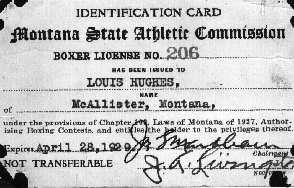
At age eighteen, Lewis was over 6 feet tall, 190 lb. and could hold his own with Dad in the boxing arena. Dad was pretty good at this sport himself, and spent lots of time coaching and training Lewis, up to the point that Lewis was in the main event at several fights put on at Ennis by Emmett Womack. Lewis and Horace Dunn (an Ennis saloonkeeper's son) battled each other in a series of wins and losses for each. Later he had a professional fight or two in Seattle, but was overmatched badly - ending his career as a pugilist.
Lewis was big, strong, and fast, and made the Ennis summer time baseball team easily, playing 2nd or shortstop. He was good at digging fast grounders out of the dirt. Batting was not that great, struck out a lot but when he did hit, it was usually good for a double or triple.
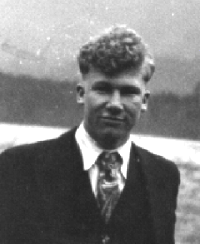
AGE 18
He attended high school for two years at Whitehall and then went out to Washington State and finished (graduated) from Bellingham High School. He lived with Aunt Ina and Uncle Clarence Kirkman in their house on the shores of Lake Whatcom. Between school terms he went back and forth between Washington state and Montana, hitch hiking and riding the rails.
MARRIAGE
In 1934, Earl Sprout and his family bought the property across the road from the Hughes home ranch, an important event in Lewis's life. The oldest of Earl's attractive daughters was Mildred (always known as 'Midge'), two years younger than Lewis. They were married in Bozeman, October 7, 1936, at the home of Midge’s aunt, Irene Stevens.
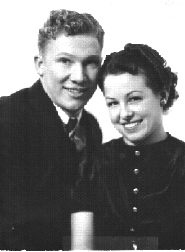
Wedding Picture
Lewis obtained employment on the Fort Peck Dam which was under construction and moved with his bride to McCone City, a shanty town on the outskirts of Fort Peck. Midge's brother, Herb Sprout, also employed at Fort Peck at the time, wrote about life in McCone City:
"Lewis and Midge lived in a shack made of slabs and covered with tar paper. It was one room, probably about l4 by 24 feet. A cold, cold, building. Frost would come through on the nails, and add to the coldness. They had a small, little, wood heater that had to be well banked. Fairly warm in the evening, but getting up in the morning - Wow."
DISASTER
Lewis was employed as a steel worker and worked in the shafts, in which were being built control gates for the diversion tunnels. The shafts resembled huge concrete chimneys which started at the tunnels underground and towered above ground for several hundred feet. They would eventually be completely covered with dirt which formed the earth fill dam.
In early January, l937, Lewis and three other workers were being hoisted up inside one of the shafts when a cable jumped off of a pulley, and broke the cable to the cage in which they were riding. They dropped nearly 200 feet but there was enough air cushion to somewhat soften the impact. Two of the men were killed. Lewis and a man named Anderson survived but both were severely injured. It became my duty to inform the new bride that her husband was about to die.
They had a car, but it seemed best for her to be near the hospital, so I moved her into the hotel, which was only a couple of blocks away. He lingered with about a 50/50 chance for a few days, then the doctors told us there was no hope because the wound in his back had developed infection. They were, however, going to try a new wonder drug called "sulfa"-the first antibiotic. It worked!
They released Lewis from the hospital in the spring, probably March or April. I helped them move back into their little house on South Meadow Creek, down by the fish hatchery. By fall Lewis was on the road to recovery but it would be months before he could even work part time. Midge needed a few more credits to qualify for a limited Montana teacher's certificate, so they went to Bellingham and Midge attended the Normal School. The following winter, back in Montana, she obtained her first teaching job.
FORTY YEARS OF TEACHING
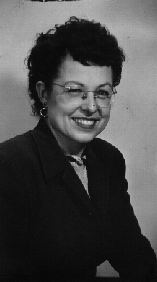
MILDRED (SPROUT) HUGHES
Herb's 1995 letter provides a glimpse Midge's outstanding teaching career.
"Midge's first teaching job was on a ranch with a total count of two students, in the same family. The post office was Hammond, Montana. The next year she was in Ekalaka, Montana. Her teacherage was screened off with a sheet stretched over a wire. She cooked on a little Coleman gasoline stove. She had to stoke the school room heater with wood and coal, and melted snow for water. It was primitive.
Herb continues,
Herb recalls, "Midge's third job was at Elk creek, north of Wilsal. A good job, comparatively. She took her sister, Betty, to go with her and attend her school. Next, Midge taught a couple of years at McAllister, and then landed a job at Ennis where she taught until retirement. Forty years of teaching."
More from Herb's letter, "After 'Sug' (Elaine Vincent) and I were married in 1942, Lewis, Sug, and I, went to Seattle to work in war industries. Lewis worked at the Lake Washington Shipyard and returned to Montana in 1944. Midge’s Mom kept Larry while Midge was teaching ."
COUNTY COMMISSIONER CANDIDATE
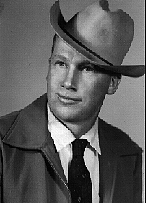
LEWIS A. HUGHES
SCHOENBERGER PLACE
The Schoenberger place eventually became the Lewis and Larry Hughes Ranch.
Even though it was one of the early homesteads in the Meadow Creek area it was slow to develop into a prosperous ranch due to the lack of irrigation water. It was better known during prohibition days for being moon-shining headquarters than as a productive ranch. People by the name of Stoker lived there in the 1920s, they had one of the first radios to come to Meadow Creek. I can remember going up with Mother and Dad and we would spend an entire evening listening to scratchy old time fiddle music from Calgary. There wasn't much of a road into the place and we went through the fields and a neighbors orchard. We did not have a car and rode in a spring wagon pulled by a two horse team. The antenna wire for the radio came from the attic down to the radio sitting on the table in the middle of the kitchen. I remember a whiskey bottle sitting on Stoker’s table, and that he was in some kind of trouble with the Feds. Parts of the old still were there years later when Lewis took over the property
ME'N DAD AND HORSESHOES
By Lewis A. Hughes. (1.6.2)
Dad was a fierce, incorrigible competitor. He just didn't like to get beat. His expertise at baseball, track events, horseshoe pitching, and pool was startling, like he had a lot of experience somewhere. Dad never squealed, but years later, Dad's cousin, Walter Vincent, told me: "Why, Uncle Tom had a baseball diamond and track field in his hay field, and by the buildings, a horseshoe pit, a swimming hole and a pool table. Tom was a whiz at all these sports and undisputed champion. "Why all the gingerbread?” I asked. "Probably in lieu of wages." Walt says with a wry grin, noting Uncle Tom's known parsimony about money.
At Dad's horseshoe pit we threw work horse shoes at 6 inch pegs in a spinning method so the shoe dropped over the top for a ringer. Ringers scored 5, leaners 3, and closest shoe counted one. Games went to eleven. I cared little for this game as Dad would beat me unmercifully and Bob (1.6.4), at a young age, usually beat me too. One summer Uncle Roy came from the coast to visit, and brought modern horseshoes with three and one half inch opening and l8 inch pegs. Roy demanded that all pits be filled with sand. We had to learn an "open shoe,” but the ringer percentage increased.
Ringers now scored 3 and games went to 21. I think Uncle Roy had practiced religiously at his home on the west coast and was on the trip to avenge past thrashings at Uncle Tom's Ranch. Uncle Roy was loud and jocular in his success, but Dad caught on in short order. They were "in the pits" so much that Mom was wondering who was "changing the water" out in the fields. Uncle Roy had a tendency to sulk when things went poorly, and as Dad began to win more games the amount of time they talked to each other decreased.
Now an unexpected factor entered. Guess who was getting even with Dad and Uncle Roy? Bob and I were challenging our elders. This just about stilled communications with Uncle Roy. He eventually couldn't pitch any more from a sore thumb and went home unavenged.
I landed a job buck raking hay with old Pete and Jack, the best buckrake horse team I ever drove (Dad had picked them up as outlaws). The wages were $3.50 per day if the boss saw you did as much as a grown man and took care of your team. I sweated the boss would say: "You're too young to earn a man's wages," but Will Fletcher paid in full and said "Good job, son."
I went to Angle Hardware and bought a horseshoe set. Old Waller (Pop) Angle ruffed my ego when he deliberately taunted me with a twinkle in his eye "Where'd a kid like you get all that money?" I let it pass because I'd seen that little grin that flickered for a second.
Some evenings John came over and we had a four some. We got better and I believe us kids were beating Dad more than 50% of the time. He began to find fault with my long first step. "Dammit, anyone can put it on the peg if you're on top of it." One evening his shoes began to flop and roll out of the pit. I retrieved one and noticed the rear caulks were missing.
"What happened to these shoes?" I asked.
I sawed them off, they balance better." Dad replied. Well, it wasn't funny. After all, they were my shoes. We quit early because I was "ticked".
Next several nights we played kind of stiff like and I was kinda laughin' (to myself) as he struggled with his shoes, sometimes rolling 20 feet out of the box. About the fifth night Dad was there first, throwing my shoes. Finally I had to pick up the mutilated shoes. They flew like ducks and rolled like rubber tires. He beat me bad and went to the house with a cocky jounce to his step. The next night I got there first and reclaimed my shoes. He didn't hesitate and picked up his shoes like everything was normal. I beat him bad and we quit early. All summer whoever arrived first got first pick of the shoes."
Lewis’s shoulder eventually got so lame that he could no longer pitch horseshoes. By that time his grand-children were playing championship basketball, and this may have given him even more enjoyment than his own sports participation. Watching them on the court was a source of tremendous satisfaction and joy to him in his last few years.
Midge passed away in 1987 and I (Lewis) lived alone, under the watchful eye of Larry and Claudette, but taking care of himself until the end, in 1995. Their legacy, in the true Meadow Creek pioneer spirit, is 40 years of hard work, turning barren property into a productive ranching operation.